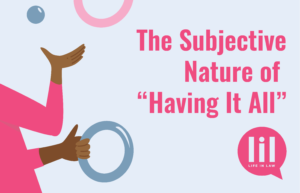The Subjective Nature of “Having It All”

“Jacinda Ardern retires: Can women really have it all?” While Thursday’s (original) BBC Headline was, in my non-journalist’s opinion, tired and clearly meant to evoke some knee-jerk reaction about the state of women in society, it was, at least, thought-provoking. Like many others, my first thought was to wonder if the BBC would ever ask “can men really have it all?” It was more of a rhetorical, rage-filled thought, I confess. But now that the red glow has dissipated from my eyes, the thoughts and questions are more nuanced: what does it mean to have it “all” and do we really want it “all” anyway?
Second confession: I never read the article. That is what happens when your headline causes an instantaneous reaction of disgust and anger and your reader decides that her time is better spent doom-scrolling through Twitter. I presume, however, that, what the BBC is really asking is, “can a woman successfully meet the demands of family and have a fulfilling career?”, where “all” means motherhood and profession.1 The first problem with that definition of “all” is that it presumes that all women’s identity is bound up in notions of femininity, motherhood and caretaking. Women, however, are not some homogenous group. Not everyone aspires to have children. Even for those that do, primary caregiving may, by intention, fall to a partner. When we assume all women have the same conception of “all”, we negate women’s choice and undermine individual experience. We also make it difficult for men to have a conception of “all” that does not assign them a diminished role in parenting. Men’s “all” becomes stereotypically defined as primary breadwinner – the successful businessman – when that may not be their life choice either.
The second problem is that “all” appears to be defined as “all at once”. One of my business partners once said to me that I could have it all but not necessarily all at the same time. It was good advice. It moderated my expectations but also gave me freedom to pursue my goals on my timetable. Importantly, it allowed me to free myself from some of the emotional burden that comes with the inevitable sacrifice when one of my choices (whether that be home life or career) had to take precedent over the other.
While it is difficult to have it all, all at once, once you have it “all”, it is especially difficult to sustain it. The third problem of the question of whether women can have it all is that it presumes that not only must we strive to have it all, but we must sustain everything over the long term. How bloody exhausting, to keep everything going at full pace all the time, apparently without ever getting tired or needing a change.2 Why must change be presented as a failure – an inability to have it “all” – as opposed to the decision to prioritize one thing over another in any given stage of life? In my conception of having it “all”, one thing must at least be the ability to make choice without this type of scrutiny or sense of failure.
The fourth problem is that it presumes women, or indeed anyone, wants to have it all. I realize that “having it all” is synonymous with success and therefore we assume it is a good thing. However, what is meant by “all” can change depending on the state of one’s life or career, creating a cycle where others think you have it “all”, only to lose it in their eyes as time passes. More importantly for me, setting goals and having challenges to meet is exciting. Chasing a dream, trying to meet a challenge motivates me every day. If “having it all” means losing that motivation, I’ll take a pass, thanks.
So, BBC, the answer to your question may be, no. I also don’t think that all men necessarily can have it all either. But, maybe instead of asking whether women can have it “all”, we should give up on imposing our preconceptions of what women should strive for and focus on supporting them in creating their own definition of “all” and in their efforts to achieve what they have determined as success. It may not make a good headline but it may make for a more fair and equitable society.
1 This is a pretty narrow and self-centered conception of “all”. If I had it “all”, there would not be an aching feeling in my stomach most days about the state of the world – whether the climate will sustain future generations, whether the people sleeping in tents or on sidewalk grates have enough to eat, whether Russia will continue its imperialistic march. In which case, I am afraid to say that I will never have it all. But, let’s focus on motherhood and profession, shall we?
2 To be clear, sometimes men get tired and need a break too but query whether society gives them the opportunity to voice those perceived vulnerabilities and what the headlines would be if they did.
About The Author

Cynthia Kuehl is a senior Partner with Lerners LLP. A seasoned litigator with a skill set honed from years of actual on-her-feet experience and a common sense approach to problem-solving, Cynthia practices in a wide range of areas, including commercial litigation and arbitration, appellate advocacy, public and administrative law, professional regulation and health law. She has appeared as lead counsel at trials, applications, arbitrations and on appeals, and has litigated before every level of court including the Supreme Court of Canada. In addition to her leadership roles at the firm, she has been and continues to be an active leader in the legal and larger community.